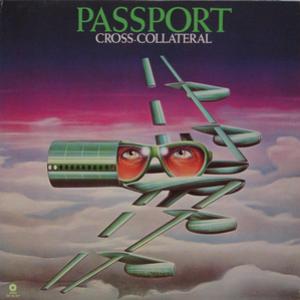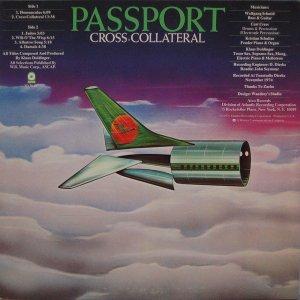Cross-Collateral
by Passport


Artist:
Passport
Label:
ATCO Records
Catalog#:
SD 36-107
Format:
Vinyl
Country:
United States
Released:
1975-02
| Tracklist | |||
| A1 | Homunculus | 6:09 | |
| A2 | Cross-Collateral | 13:38 | |
| B1 | Jadoo | 3:03 | |
| B2 | Will-O'-The Wisp | 6:15 | |
| B3 | Albatros Song | 5:18 | |
| B4 | Damals | 4:38 | |
Credits
Bass, Guitar - Wolfgang Schmid
Drums, Percussion - Curt Cress
Piano [Fender], Organ - Kristian Schultze
Written-by, Producer, Saxophone [Tenor & Soprano], Synthesizer [Moog], Piano [Electric], Mellotron - Klaus Doldinger
Notes
ATLANTIC™ 1975
A Warner Communications Company
Strawberry Bricks Entry:
Hailing from Munich, saxophonist Klaus Doldinger (b. 1936) had an illustrious career throughout the 1960s, playing with such jazz luminaries as Don Ellis and Donald Byrd. But in the late 60s, he hooked up with the younger generation to explore psychedelic and jazz-rock terrains. He recorded two albums on the Liberty label with Motherhood, a band that included the yet-to-be-famous Udo Lindenberg on drums and a pre-Amon Düül II's Lothar Meid on bass. Adding Jimmy Jackson on organ and Olaf Kübler on tenor saxophone, they morphed into Passport in 1971. Amidst ever-changing lineups, Doldinger would release another couple of albums (the first two compiled as Doldinger in the US), as he refined his jazz-rock compositions into his own brew of fusion. The great breakthrough came on the fourth album, Looking Thru, in 1973. Doldinger had now assembled his formidable all-German team: bassist Wolfgang Schmid, drummer Curt Cress and keyboardist Kristian Schultze. Doldinger's soloing style is lyrical, as are his melodies; and Passport always delivered jazz-rock that was easy to digest: never dense or overly technical, yet with enough weight to avoid fluff. It all reached a peak here on Cross-Collateral. "Homunculus" soars high above its huge bass line. The title track gets hyperkinetic; but after Cress's break, it slows down into a funkier groove, before again being propelled by Cress's quick tempo. The second side follows in similar style; "Will-O'-The Wisp" sways to its crispy electric pianos, while "Albatros Song" floats through its more open arrangement. The following year saw the band release the like-minded Infinity Machine. Doldinger took Passport to Brazil for their next record; and despite the obvious Latin flavor, the album, as the cover art would suggest, signaled the start of a more commercial slant that Doldinger would pursue well into the 80s.

